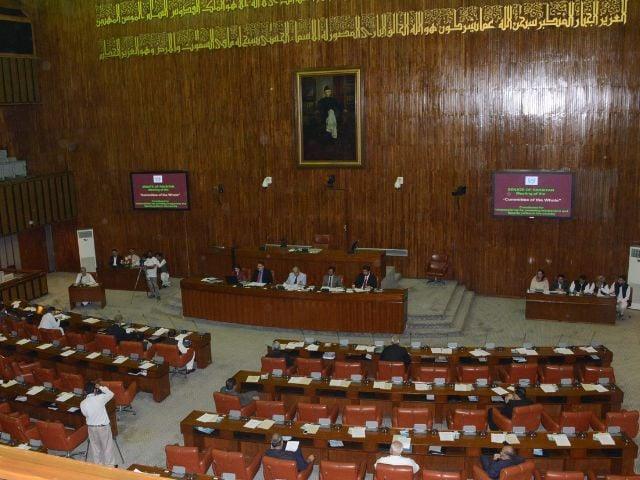The Senate approved the prevention of electronic crimes (PECA) (amendment) Bill 2025 and the Digital Nation Pakistan Bill 2024 Tuesday, in the midst of a Walkout from journalists and protests from opposition members.
Chairman of the Vice-President Syed Al Nasser dealt with the session a 16-point agenda, where the Bill on Electronic Crimes (amendments) was presented for approval. The bill was adopted despite objections raised by opposition parties and media groups.
The Peca Act was already approved by the National Assembly and the Senate Interior Committee in the past. A majority vote also adopted the digital nation of Pakistan Bill 2025.
During the session, Defense and Aviation Minister Khawaja Asif discussed the resuscitation of minor airports and said Chitral’s airport is now in operation. He also mentioned that Pakistan International Airlines (PIA) improved where flights were resumed to smaller airports and new aircraft were acquired.
Pia’s resuscitation was recognized and the government is working to open new routes, including those to Chitral and Northern Regions.
Senator Saifullah Abro raised concerns about Pia’s limited fleet and poor operations and highlighted the need for more aircraft and timely aircraft operations. In response, Khawaja Asif assured that Pia was recovering, with new routes and flights in progress.
The session also witnessed Senator Azam Nazir Tarar introduced migration smuggling of amendments to amendments 2025 and the immigration order change proposal 2025. Both bills were referred to the relevant standing committees.
Later, the Minister of Law Azam Nazir Tarar presented the digital nation of Pakistan Bill 2025, which adopted a majority despite opposition protests.
Opposition members, including Senator Shibli Faraz, expressed concern about the lack of consultation on the bill and opposed how the procedure was done.
Pakistan Peoples Party (PPP) voted for the bill. During the session, Senator Kamran Murtaza’s proposed changes to several sections of the bill were rejected. The senator accused the government of violating provincial autonomy and concentrated power in Islamabad.
Protests from journalists over Peca Bill -Presk
Thereafter, federal minister Rana Tanveer Hussain moved the proposal to present the electronic crime prevention (amendment) Bill 2025, related to preventing electronic crimes in parliament. This bill (PECA ACT) was already unanimously approved by the National Assembly and the Senate Committee.
At this time, parliamentary journalists staged once again a walkout from the press gallery. Pakistan Radio Association (PRA) shouted slogans and called the PECA change proposal a “black law” and journalists left the press gallery in protest.
On this occasion, the PPP senator Sherry Rehman came to the press lounge to show solidarity with the journalists. She said, “We support the changes of journalists. Stakeholders were not heard of the PECA law.
This bill was not discussed in the committee and PPP does not support it. We will sit with the journalists and bring changes to the PECA bill. We work against the formation of a council in the PECA bill. Bilawal Bhutto has stated that we are standing with the journalists on this question. “
The Senate began the process of clause-for-clause approval of the PECA ACT change proposal 2025, while Senator Kamran Murtaza’s proposal for further changes was rejected. The Senate then adopted the PECA ACT change proposal’s bill 2025 by majority.
What is peca?
The Pakistani government strengthens the law on the prevention of electronic crimes (PECA) with new changes to tackle fake news and illegal online content. The proposed law on the prevention of electronic crimes (amendments) 2025 imposes serious sanctions, including up to three years in prison and fines of RS2 million for the spread of disinformation.
An important provision is the creation of a Digital Rights Protection Authority (DRPA), which is tasked with regulating social media platforms and removing illegal content.
DRPA will have powers to investigate complaints, remove content and enforce digital ethics. The changes also redefine social media platforms and require compliance with social media companies that may require registration and appointment of local representatives.
While supporters believe the amendments are important to fight false news and hate opinion, critics warn of potential censorship and abuse.



